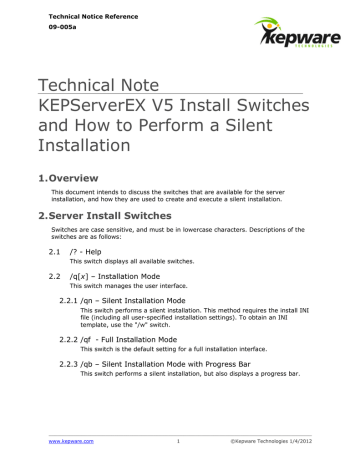
- #Kepserverex command line serial
- #Kepserverex command line code
- #Kepserverex command line license
- #Kepserverex command line free
Documentation from the original author.
#Kepserverex command line free
#Kepserverex command line code
However, if you want to try a different fork that works with Python 3.4+ (if you make some minor changes to the Python source code that affects Pyro4), go to the GitHub version of Anton D. Interested in the original version from Barry Barnreiter? Go here. The procedure described here allow us to integrate OpenOPC 1.2.0 with recent versions of Python (v3.7+) and Pyro4 (v4.80+) installed on Windows. Also, includes a Windows gateway service that enable non-Windows clients to also access OPC-DA calls. OpenOPC for Python is a free, open source and easy to use OPC (OLE for Process Control) library that works very well with the popular Python programming language (now, version 3.7) on Windows. It’s possible to use it from learning how the OPC DA protocol actually works to connecting to multiple servers and building applications for deeper data integration. The command line arguments are documented in the help system for each server.OpenOPC and Python 3.7 on Windows is the right setup when working with certain industrial automation projects that implement industry-tested OPC DA servers. Starting a Kepware Products Server AutomaticallyĮach Kepware Products DDE server has a runtime command so it may be started automatically when the Windows operating system loads.

#Kepserverex command line serial
Because this server uses SIXNET Universal protocol for serial communication, you can run SIXNET utilities without having to reconfigure the serial port. This DDE / OPC Server responds to DDE and OPC commands and sends the appropriate SIXNET Universal protocol commands over Ethernet and serial ports to SIXNET stations and I/O modules.

#Kepserverex command line license
A license for a fully functional KepServerEx for SIXNET I/O may be purchased from Kepware Products. The KepServerEx is provided on the SIXNET CD and is licensed for use with up to 32 SIXNET I/O or two SIXNET stations only. SIXNET communications will not be possible until the station or I/O module’s serial port is reset for SIXNET Universal protocol mode.) The KEPServer supports a large number of SIXNET stations and I/O modules. (Note that any serial port used for the KEPServer must be configured for Modbus RTU Slave mode. This DDE / OPC Server responds to DDE and OPC commands and sends the appropriate Modbus RTU protocol commands over Ethernet and serial ports to SIXNET stations and I/O modules.

The KEPServer is provided on the SIXNET CD and is licensed for use with SIXNET I/O only. All levels of the SIXNET I/O Tool Kit have a tag name exporting feature for both of the Kepware Products servers. Once a Kepware Products DDE server is running, all I/O registers in the station(s) and/or I/O module(s) are available to any DDE-compatible program. There are two DDE servers from Kepware Products that allow any Windows application with DDE support to access I/O registers in SIXNET stations and I/O modules.


 0 kommentar(er)
0 kommentar(er)
